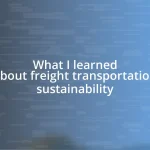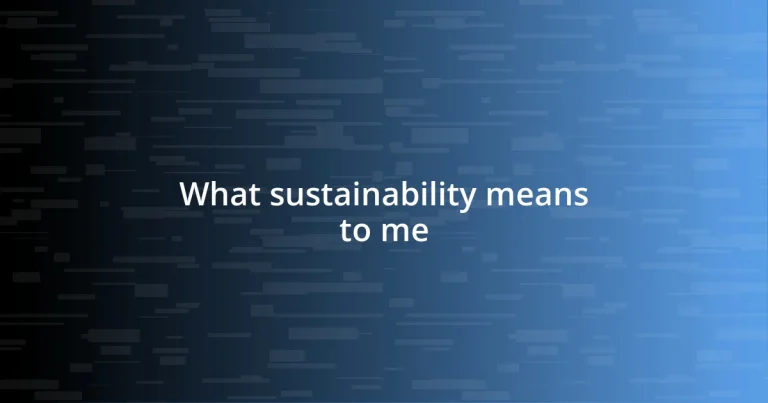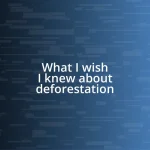Key takeaways:
- Sustainability involves a lifestyle shift, emphasizing mindful consumption and individual impact on the environment.
- Personal values like respect for nature and community involvement guide sustainable practices and foster a sense of connection among community members.
- Long-term sustainability goals include promoting renewable energy, sustainable transportation, and education to inspire future generations.
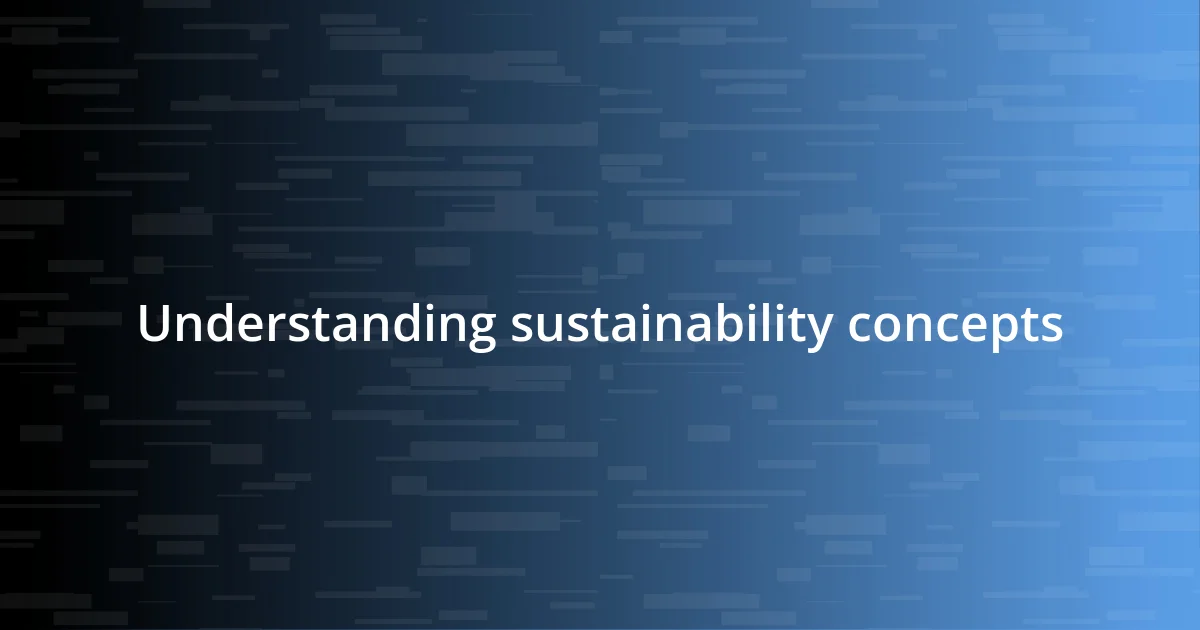
Understanding sustainability concepts
Sustainability, at its core, is about balance. I remember walking through a thriving community garden and feeling an overwhelming sense of hope. It struck me how diverse plants coexist, each contributing to a vibrant ecosystem. Isn’t it fascinating to think that our choices can create similar harmony in our lives and communities?
When we talk about sustainability, we often think of reducing waste or recycling, but it’s so much more—it’s a lifestyle shift. I once attended a local sustainability workshop where the speaker emphasized the importance of mindful consumption. It challenged me: Can we truly enjoy what we have while prioritizing the planet? Those conversations lingered in my mind long after, motivating me to rethink my habits.
It’s crucial to understand that sustainability isn’t just for environmental enthusiasts; it’s for everyone. I’ve seen my friends transition to more eco-friendly practices, finding joy in small changes like using reusable bags or composting kitchen scraps. Isn’t it empowering to know that each of us has a role in creating a sustainable future? Even the smallest step can lead to significant change, fostering a sense of community and shared responsibility.
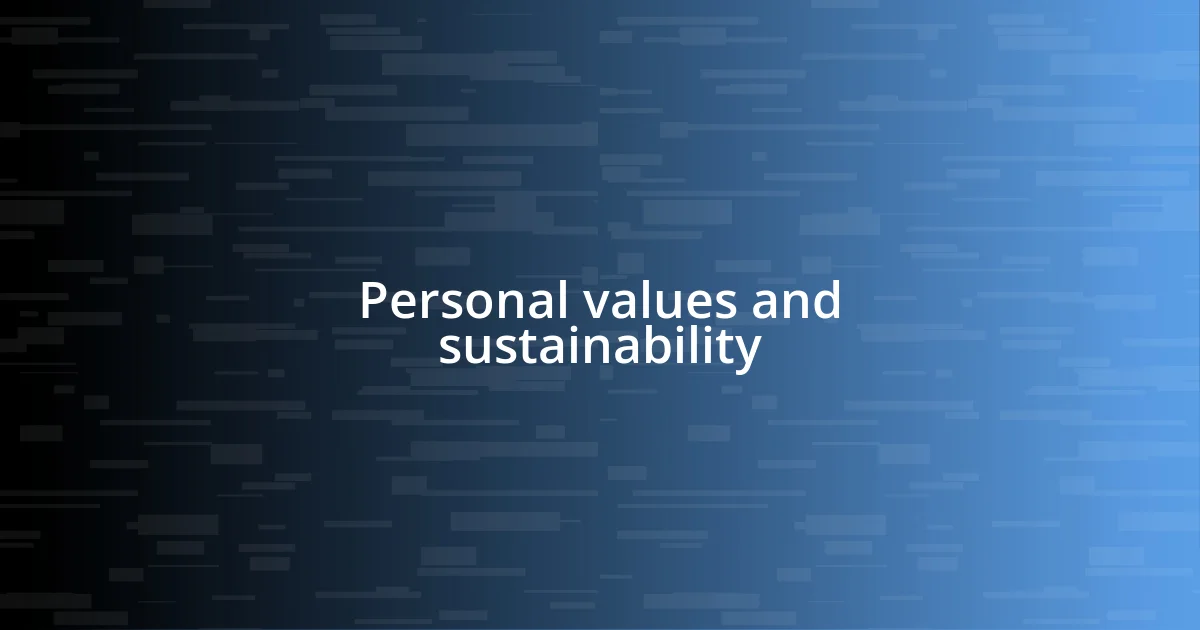
Personal values and sustainability
I’ve realized that my personal values heavily influence how I engage with sustainability. Growing up in a family that cherished nature instilled in me a deep respect for the environment. Many weekends were spent hiking or camping, where I felt an inherent bond with the earth. This connection drives my commitment to sustainability; for me, it’s not merely a trend but a way of honoring those experiences and preserving our planet for future generations.
In my journey, I’ve identified key values that align with sustainability, such as:
- Respect for Nature: I feel a responsibility to protect the beauty I’ve always cherished.
- Community Involvement: Working together towards common goals creates a stronger sense of belonging.
- Mindfulness: Making intentional choices in daily life, from food to clothing, reflects my values.
- Education: Sharing knowledge about sustainability empowers others to join the movement.
- Empathy: Understanding how our choices affect vulnerable communities inspires me to advocate for fair practices.
These principles guide my actions, shaping how I live and interact with the world around me.
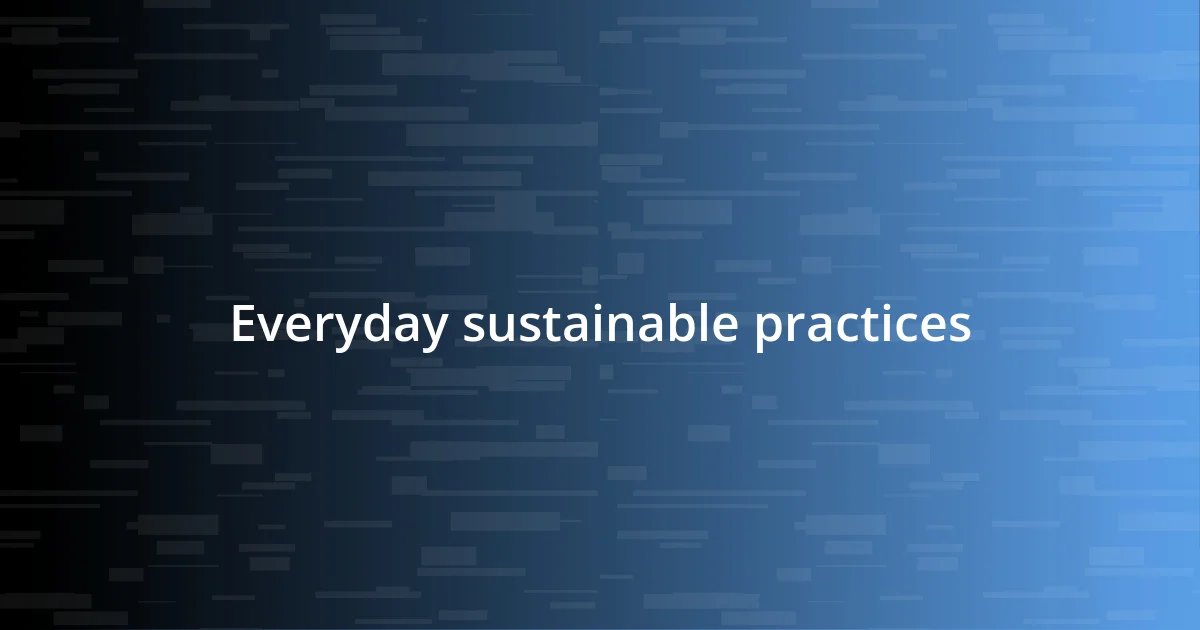
Everyday sustainable practices
Everyday sustainable practices are often woven into the fabric of our daily routines. For instance, I’ve started carrying a stainless steel water bottle everywhere I go. Not only does it remind me to stay hydrated, but it also drastically reduces the plastic waste I used to contribute each month. It’s surprising how one small change can feel empowering—like taking a stand for my values in a tangible way.
One practice I’ve embraced is meal planning. I’ll admit, it took me a while to get into the rhythm, but now I find joy in selecting seasonal ingredients and reducing food waste. When I plan my meals, I buy only what I need, which means fewer trips to the grocery store and less impulse buying. Plus, it’s a fun challenge to create new recipes with the ingredients I have on hand. It’s amazing how this simple act can contribute not only to personal health but also to a healthier planet.
As I watch my friends adopt similar sustainable habits, I realize we’re creating a ripple effect. A friend of mine switched to biodegradable cleaning products and shared her excitement about it. She said, “It feels like I’m investing in a cleaner home and a cleaner planet.” It’s these shared experiences that motivate me to keep exploring new sustainable practices and encourage others to join in, one small step at a time.
| Sustainable Practice | Impact |
|---|---|
| Reusable Water Bottles | Reduces plastic waste and encourages hydration |
| Meal Planning | Minimizes food waste and promotes health |
| Biodegradable Cleaning Products | Safer for the environment and home |
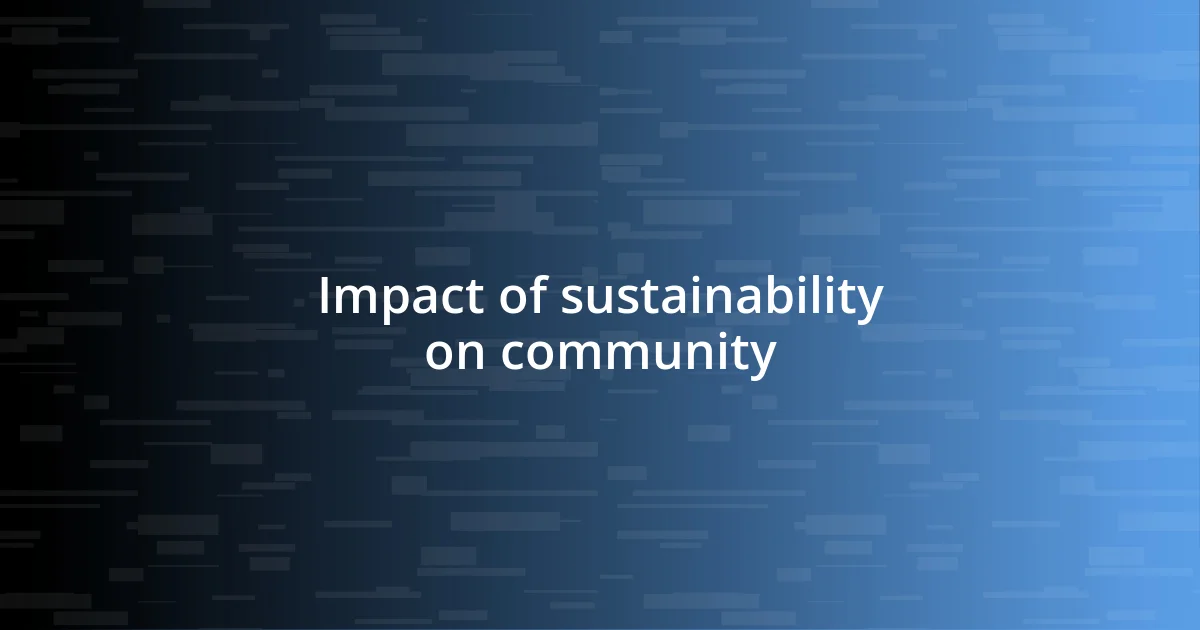
Impact of sustainability on community
Fostering sustainability within a community creates a powerful sense of connection among its members. I remember attending a local clean-up event last year, where people of all ages came together to restore our nearby park. There was a palpable energy in the air, as laughter and friendly banter flowed alongside the clinking of trash bags being filled. It’s moments like these that show how sustainability can unite us, building stronger relationships and a shared purpose.
Moreover, sustainability initiatives often encourage innovation and creativity within the community. I was inspired when our local farmers’ market started featuring workshops on sustainable gardening. Participants learned to grow their own food while reducing their carbon footprint. I’ve seen how these gatherings not only educate but also spark friendships and collaborations, as people exchange tips and ideas. Isn’t it remarkable how sustainability becomes a shared journey that enriches our lives?
Ultimately, the impact of sustainability on a community transcends environmental benefits. It nurtures empathy and awareness among residents. I’ve noticed how neighbors now check in on each other’s recycling efforts or share resources, like tools for gardening. This shift in mindset fosters a culture of support that feels heartwarming. Doesn’t it make you wonder how something as simple as sustainability can transform our shared spaces into thriving hubs of connection and care?
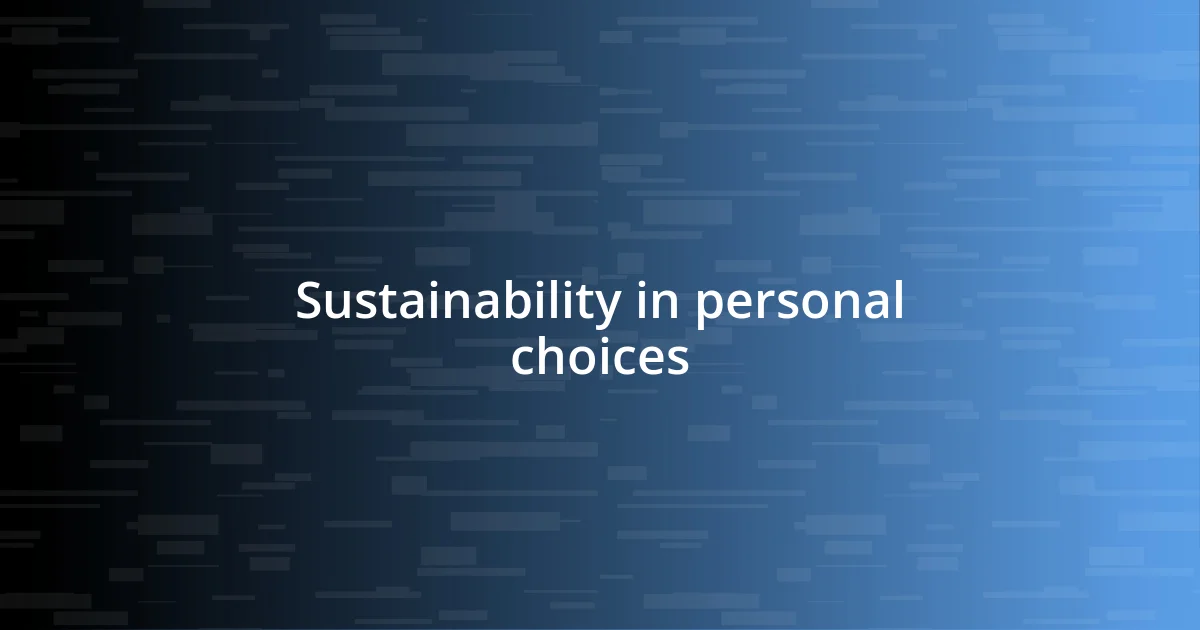
Sustainability in personal choices
Every small choice I make has the potential to contribute to sustainability in my own life. For example, I’ve switched to purchasing second-hand clothes whenever possible, which not only saves money but also offers a unique style. It’s funny how I often find pieces with stories behind them, and this practice gives me a sense of fulfilling my fashion needs while minimizing textile waste.
In my kitchen, I’ve adopted the habit of making my own cleaning supplies using common household ingredients. The first time I combined vinegar and baking soda, I felt like a scientist in my own lab—excited to experiment! Not only do I save money, but there’s also a weight lifted off my shoulders knowing I’m avoiding harsh chemicals that could harm my family and the planet. Have you ever considered how freeing it can be to reduce reliance on commercial products?
I also prioritize local purchases, visiting farmers’ markets and supporting small businesses. One memorable Saturday, I spent an afternoon chatting with a farmer about his organic practices and where my food comes from. This connection not only enriched my grocery list but also made me appreciate the hard work and care that goes into producing food. Isn’t it fascinating how personal choices like these can create a meaningful bond between consumers and their communities?
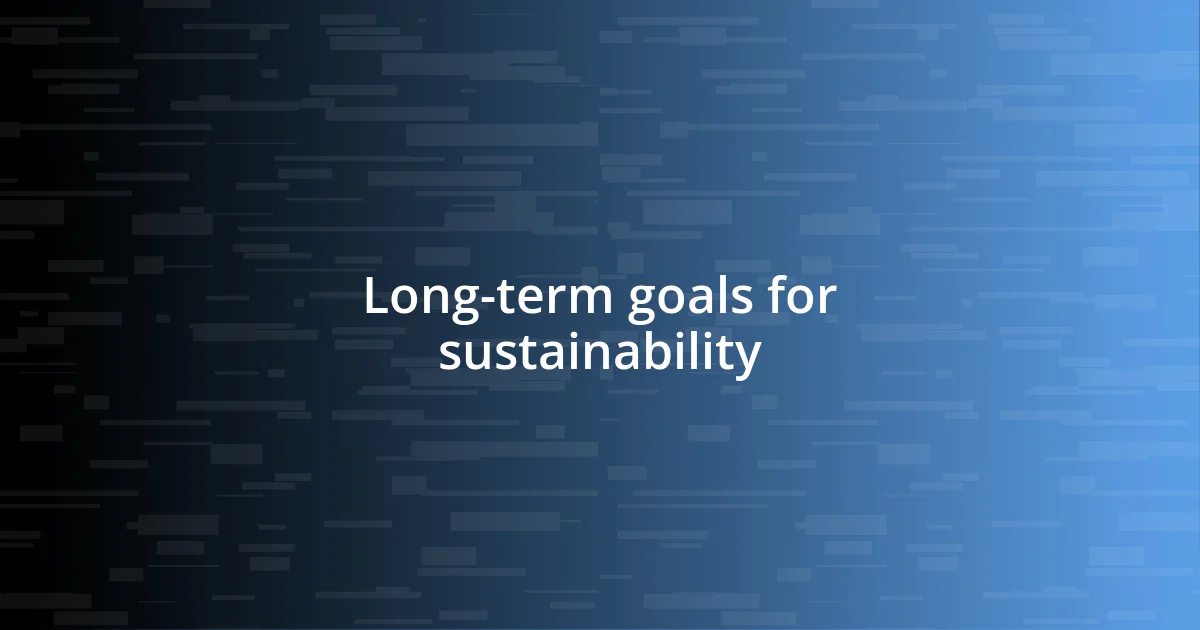
Long-term goals for sustainability
Long-term goals for sustainability are essential for creating a meaningful and lasting impact. For me, envisioning a future where our communities rely on renewable energy sources excites me. Just imagine walking through a neighborhood where every rooftop glimmers with solar panels, powering homes while reducing the strain on our planet. Doesn’t it feel like we could really transform the way we live by harnessing nature’s energy?
Another goal that resonates deeply with me involves the push towards sustainable transportation. I remember the thrill I felt when I decided to start biking to work instead of driving. Not only did it clear my mind and boost my mood, but I was also part of a growing movement towards cleaner air and less congestion. When people embrace alternatives like biking or public transit, we collectively create cleaner, healthier cities. Can you picture the benefits if more of us made that leap together?
Additionally, I believe in the importance of education as a cornerstone for long-term sustainability. One of my most cherished memories is leading a workshop on waste reduction at my local community center. Seeing the faces of attendees light up with new ideas sparked my passion for teaching others how to live sustainably. I often wonder: what if we could inspire the next generation to prioritize environmental stewardship? In the long run, nourishing this mindset could lead to an empowered society that embraces sustainability as a way of life.
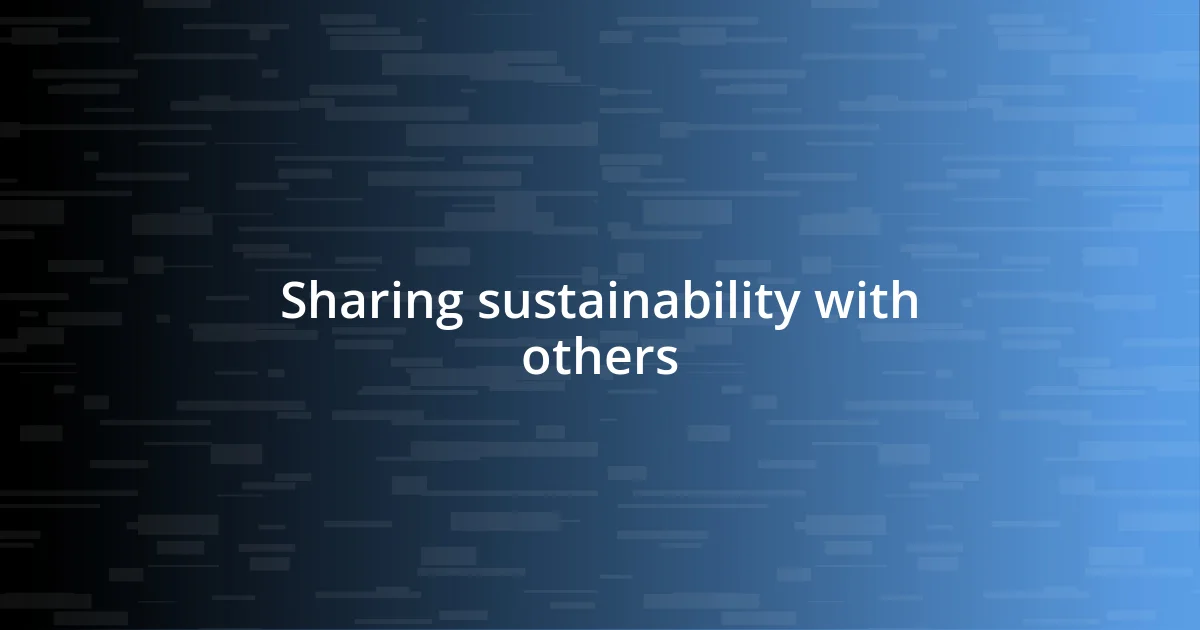
Sharing sustainability with others
Sharing sustainability isn’t just an individual journey; it’s a communal adventure. I remember hosting a small gathering with friends where we all brought our favorite sustainable products to share. It was remarkable to see everyone’s enthusiasm, from swapping recipes for eco-friendly cleaners to exchanging tips on cutting down waste. Have you ever seen the power of collective knowledge in action? It was a moment that reinforced my belief: when we uplift each other, we amplify our impact.
Another meaningful experience was when I volunteered at a local school to help children understand recycling. The sheer joy on their faces as they sorted different materials was infectious. I’ll never forget the moment a little girl raised her hand and exclaimed, “We can make art from trash!” Her excitement reminded me that even the youngest among us can inspire profound change with their creativity. Isn’t it heartening to think that sharing sustainability can plant the seeds of environmental consciousness in the next generation?
Lastly, I’ve discovered the beauty of collaborative gardening with neighbors. We created a community garden, and the sense of teamwork while planting, watering, and eventually harvesting was incredible. Sharing the fruits of our labor—literally!—brought us closer and fostered conversations about organic practices and local ecosystems. Have you ever felt the deep satisfaction of growing something that benefits everyone? It’s experiences like these that show me how interconnected we truly are in our pursuit of sustainability.




